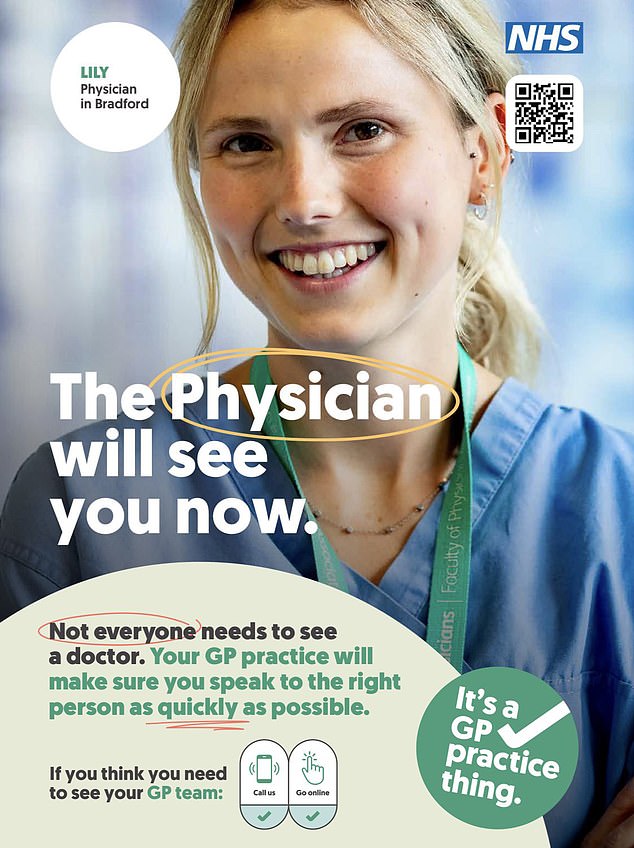From her blue scrubs to her reassuring smile, the woman pictured in information posters in GP practices in Bradford certainly gave the impression she was a doctor.
And the wording, ‘The Physician will see you now’, seemed to leave no room for doubt.
But the poster was actually about physician associates (PAs). These are healthcare workers who have had just two years’ training – compared with a GP’s ten – and who are only allowed to diagnose and treat patients under supervision.
When doctors started to complain, the posters – which were designed to explain the range of healthcare workers in GP practices in the area – were swiftly removed. But what happened at Bradford District and Craven Health and Care Partnership last year is just one example of where PAs have been misleadingly presented as regulated health professionals.

Posters about physician associates (PAs) in Bradford (above and below) were removed after complaints that they were being misrepresented as doctors

In September, for instance, the Advertising Standards Authority issued a warning to a GP practice after it misled patients about the level of training PAs have.
On its website, Churchfields Surgery in Bromsgrove, Worcestershire, told patients that PAs ‘train in and are examined in all areas of medicine’ and that training ‘encompasses medication and prescribing, just as a trainee doctor would receive’.
In fact, PAs are not trained in all areas of medicine, and the practice was told not to conflate ‘the respective roles, training and duties of PAs and GPs’. It has since altered the wording.
In another recent case, Alder Hey Children’s NHS Foundation Trust admitted that it had replaced a paediatrician with a PA in its safeguarding team to carry out medical checks on children thought to have been sexually abused. This mistake could mean those suspected of the abuse wouldn’t be sent for trial, as PAs are not allowed to give evidence as professional expert witnesses.
And despite NHS England’s chief doctor Professor Sir Stephen Powis telling hospitals in February they must not replace doctors with PAs, freedom of information data, obtained by Channel 4, found that between April and September this year, 11 trusts had used PAs to cover staff rota gaps for 109 medical shifts across departments including paediatrics, care of the elderly, A&E and trauma.
The increasing use of PAs is causing such mounting concern that the Royal College of General Practitioners has recently voted to oppose their use in general practice.
According to a report of the meeting by the King’s Fund think-tank, there was ‘a palpable hostility in the room’ – and this continued to play out on social media. ‘It has been a tumultuous time for the college,’ an RCP insider admits.

Emily Chesterton died weeks before her 30th birthday after a physician associate at her GP practice missed signs that she had a life-threatening blood clot
Then, in July, the British Medical Association published an open letter, signed by more than 13,000 doctors, warning that the skills of doctors were being ‘demeaned, devalued and even replaced’ by the deployment of PAs. It also pointed to widespread evidence of PAs substituting doctors on hospital rotas and in general practice, ‘leading to alarming situations where patients are being treated by unqualified staff’.
And last month, the Royal College of Physicians of Edinburgh called for an immediate suspension of any further recruitment or deployment of PAs across the UK until a clear ‘ceiling of practice’ is set.
With tensions running high, the Academy of Medical Royal Colleges – the umbrella organisation that represents all royal colleges – is urging Health Secretary Wes Streeting and the chief executive of NHS England, Amanda Pritchard, to organise a rapid review of medical associates (which includes ‘anaesthesia’ associates) to assess whether they are improving patient care.
Marion and Brendan Chesterton certainly would not say so. Their youngest daughter Emily died in November 2022, just weeks after her 30th birthday, after a PA missed signs that she had a life-threatening blood clot.
Emily made an appointment at her GP practice on October 31 after developing a painful left calf, breathlessness and a cough.
She thought she was seeing a GP; in fact, the person who diagnosed long Covid and a calf sprain was a PA. With her symptoms worsening, Emily returned to the Vale Practice in Crouch End, North London, on November 7, where she was again seen by a PA. This time she was given a prescription for propranolol (which slows heart rate) to relieve her ‘anxiety’.
When Emily’s concerned parents drove from their home in Salford, Greater Manchester, to collect her from that appointment, Marion, 65, recalls: ‘I couldn’t believe what I was seeing. My daughter, who had never had a sick day off in her life, was now pale, breathless and could hardly walk.’

It was only at the inquest into Emily’s death (she is pictured, right with her mother Marion, centre, and sister Jasmine) that the family learned instead of seeing a GP, she had seen a PA
They drove her back to her flat in North London, but ‘her breathlessness continued to get worse’, says Marion. ‘After taking just one [propranolol] tablet, she passed out.’
She died on the way to hospital. A coroner’s report found that a blood clot in her leg had travelled to her lungs.
‘The cardiologist who had tried to save Emily’s life told us that the propranolol was the worst thing she could have been given. It basically slowed her heart rate, which meant less blood was circulating to her heart and lungs,’ says Brendan, also 65.
It was only at the inquest after her death that the family learned that instead of seeing a GP, Emily had seen a PA. ‘We had never heard of a physician associate before, and neither had the coroner,’ says Marian.
The coroner said Emily should have been referred to A&E, and if she had been the likelihood is that she would have survived. ‘That was very difficult to hear,’ says Marion. ‘Our sorrow quickly turned into anger,’ she told Good Health in an exclusive interview to launch a campaign for clarity on the PA role.
Emily’s case triggered a landslide change in the view doctors have of PAs, says Dr Matt Kneale, an A&E doctor and member of Doctors’ Association UK, an online professional network.
‘Until that point, while I had worked with PAs professionally, like many of my fellow doctors I wasn’t really aware of what was involved in their training or the risks that they were taking – risks that have been put on them by NHS trusts and NHS England,’ he says.
PAs aren’t new – the role was introduced in 2003 to reduce the load on doctors. Initially called ‘physician assistants’, in 2013, their title was changed to ‘physician associates’, the Government arguing that it would be difficult to regulate them, as ‘assistants’ don’t act autonomously.
Yet over a decade later, they are still to be regulated (although this is meant to happen from next month). But Emily’s parents are campaigning for the job title to be changed back to ‘physician assistants’ to make their role clearer.
Meanwhile, while they initially welcomed PAs’ introduction, some of the royal colleges that represent doctors’ groups want a pause in recruitment until safeguards are in place, such as a PA register (requiring they meet set credentials), nationally agreed standards for their scope of practice – and a system to suspend or strike them off the register if they fail to meet those standards.
What might shock people to learn is that, despite the years of no regulation, the number of PAs employed in GP surgeries and hospitals has grown significantly.
There are 4,600 on the registry of the Faculty of Physician Associates (FPA) – a professional body, although registration is only voluntary – but last year NHS England published a plan to increase their number to 10,000 by 2036/37.
Patients often have little inkling that their PA is not a doctor. Almost half of patients (48 per cent) still do not understand the difference between the roles, according to a survey by Healthwatch England. Yet their training is very different.
After five years at medical school, doctors do two years of foundation training and then specialist training. At the very minimum, it takes ten years to become a GP and 13 to be a hospital consultant. By contrast, PAs do a two-year clinical skills course after a science degree.
‘There’s a real problem with the amount PAs don’t know – they’re effectively being asked to do a version of our job, but they don’t have the skills and training to do that well,’ say Dr Helen Salisbury, a GP and medical education fellow at the Nuffield Department of Primary Care Health Sciences at Oxford University.
‘The most difficult job in medicine is working out what’s wrong with someone, and the level of seriousness – and PAs don’t have the training to do it.
‘There are lots of physician associates who are aware of their limits and will say “I can’t deal with this” and hand it on to a doctor. But for some, we have a real problem with “unknown unknowns”. If you’ve never heard of something, you might not spot it.
‘Some PAs are doing quite complicated interventional things such as putting cameras down patients’ throats and into bladders, which is a skill you can learn – but it’s a question of knowing what to do if things don’t go to plan.’
She denies that doctors are just protecting their roles.
‘If I’m going to have my gas boiler replaced, I want someone who’s done the gas boiler fitting exams,’ says Dr Salisbury. ‘I don’t want an apprentice who kind of knows some of it – I want the actual expert.’

Dr Helen Salisbury, a GP and medical education fellow at Oxford University, says: ‘There’s a real problem with the amount PAs don’t know – they’re effectively being asked to do a version of our job, but they don’t have the skills and training to do that well.’
One reason for the expansion of PA roles was to cut costs, specifically on agency staff. Yet PAs typically start at an NHS pay band 7, at £46,148 a year, rising to £52,809 after five years. Junior doctors start on a basic salary of £32,398: those beginning their specialist training earn £43,923.
‘You can see why many junior doctors are angry,’ says Dr Kneale, who’s on £43,000 basic after five years’ training plus two-and-a-half years’ working as a doctor. ‘Not only are we being replaced by another profession, but we are being replaced by people who are less qualified – and get paid more.’
PAs may also indirectly cost the NHS more. Lawyers say the NHS is opening itself up to potential negligence claims by expanding the role of PAs.
Daniel Phelps, a medical negligence solicitor at Pearson Solicitors in Manchester, is dealing with two PA cases. One is anticipated to result in damages of around £1 million after a PA failed to spot warning signs of a stroke, which left the patient requiring lifelong nursing care.
Since January 2020, there have been 75 complaints about physician associates to the FPA, although the organisation would not confirm how many practitioners had been removed from its voluntary register.
The General Medical Council (GMC), which is set to regulate PAs from December, is facing legal challenges from organisations that want the distinction between doctors and PAs made more explicit. There are also calls to stop the GMC calling PAs ‘medical professionals’, and for a code of practice outlining what PAs or anaesthesia associates can – and cannot – do.
PA representatives concede that any bad blood between doctors and PAs has not been helped by some universities encouraging newly qualified PAs to think of themselves as comparable to doctors, by using terms such as ‘registrar equivalent’ – a registrar will have done at least seven years’ training.
This is clearly wrong, says Professor Jeannie Watkins, programme director of physician associate studies at Swansea University: ‘PAs are trained to provide care as physician associates, they are not doctors.’
But, far from side-stepping regulation, Stephen Nash, a PA and chief executive of United Medical Associate Professionals, adds that PAs have been campaigning ‘for regulation for the best part of 20 years’.
‘Patients should not fear that there are rogue PAs running around doing anything they want. If a PA has been asked to do a job, it’s because the person asking them to do that job knows they can do it.’
Indeed, according to research by Vari Drennan, a professor of healthcare and policy research at Kingston University, PAs are a safe addition when used appropriately and supervised.
In general practice, PAs complement the work of GPs – and, in hospitals, they provide valuable continuity within teams, she says. ‘This is in contrast to doctors in training who often come from a different hospital for a fixed time and then move on. The continuity the PAs provided was viewed as important to consultants, patients, doctors in training and other hospital staff,’ she told Good Health.
‘If you’re working with a PA in a settled, established team in a familiar role – and they’ve got good senior supervision – then some of the talk of risk is overblown,’ says Professor David Oliver, a consultant in geriatrics and acute general medicine. But, reiterating a familiar theme, he adds: ‘There needs to be a nationally set scope of practice with defined limits for PAs.’
And proper supervision. As Professor Alison Leary, a senior consultant at the World Health Organisation and chair of healthcare and workforce modelling at London South Bank University, says: ‘When we review cases where things have gone wrong in patient care, when it comes to PA cases, often you will see they haven’t been properly supervised. Where are the supervising doctors who should be overseeing their work?’
Stephen Nash agrees: ‘We’re becoming the bogeyman of the NHS.’
Indeed, there has been a backlash among patients.
‘PAs are now getting people saying, “I don’t want to see you, I want to see a proper doctor”,’ says Dr Salisbury. ‘I can understand why patients are doing it but it’s uncomfortable for the PAs.’
Professor Oliver predicts that a lot of PA graduates in future won’t get jobs. ‘I think there’s going to be a reluctance to appoint them in view of the current concerns, controversies and scrutiny,’ he says.
And there’s the rub: could all this have been done better?
‘The roll-out of PAs is the worst example of a policy implementation in the NHS I’ve seen in my life,’ says Professor Partha Kar, an NHS consultant at Portsmouth Hospitals NHS Trust and the Government’s national adviser on diabetes.
‘As someone who’s been a big supporter of the expansion of nursing roles in diabetes care, I’m not against role development at all, but it must be properly planned and reviewed from a safety point of view, with adequate training, supervision and regulation.
‘The bottom line is, would I like any of my loved ones to be seen by a PA? In the unregulated Wild West we have around this group, the answer is no.’
Back in Salford, the Chestertons say they will never move from the family home. ‘Emily’s still here,’ says Marion, with tears in her eyes. ‘Her bedroom is still known as Emily’s room.
‘What happened to our beautiful daughter was so wrong. It must not be allowed to happen to anyone else. [By campaigning] we’re trying to do something positive so that some good can come from her death.’
The Vale Practice, where Emily was seen, no longer employs PAs.
A spokesperson for NHS England said PAs are no substitute for doctors: ‘There is also clear guidance on the appropriate deployment of these roles, which makes it clear that PAs should provide support and perform tasks under the supervision of doctors to help them do their jobs.’
- The Chesterton family are fundraising for charities important to Emily. Visit gofund.me/491d3554




